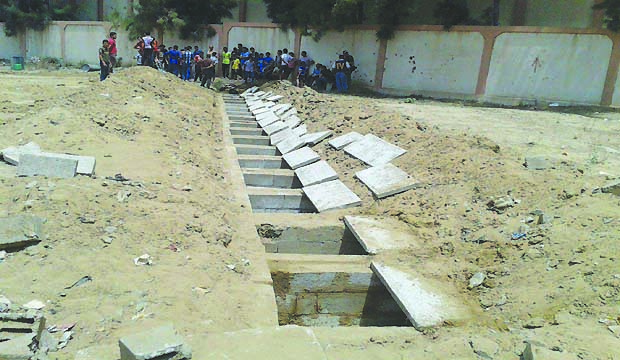
Batsh family graveyard in Gaza City. (Asharq Al-Awsat)
Gaza, Asharq Al-Awsat—Victims’ families in Gaza are being forced to establish new graveyards to bury their dead, as cemeteries struggle to find enough burial plots after sixteen days of Israeli air strikes.
Eighteen members of the Batsh family were killed on Sunday, the bloodiest day of the conflict so far, in an Israeli air strike on the home of Majid Al-Batsh in the Al-Tuffah area, east of Gaza City. Majid Al-Batsh, his wife Amal, their seven children and a two-year-old granddaughter, as well as other members of the extended family, were killed in the attack. Majid Al-Batsh is a cousin of Hamas’s Gaza police chief, Taysir Al-Batsh, who survived but suffered critical injuries in the attack.
The Batsh family was forced to convert land it owns in the Gaza Strip close to the destroyed family home a special cemetery after the local graveyard said there was not enough room to bury the eighteen members of the family killed in Sunday’s attack.
“This was our only choice. The local cemetery is overflowing, and it is impossible to reach the Martyrs’ Graveyard in eastern Gaza City due to the Israeli incursion in the area. The Israelis are shooting at anything that moves in the area,” Abu Al-Haitham Al-Batsh told Asharq Al-Awsat.
Abu Al-Haitham said that Gazan families often seek to bury their loved ones as close to home as possible so that they can visit their graves.
“The Israeli occupation killed our children twice: first when they completely destroyed our home and brought it down on their heads, and second when they prevented us from burying them in a consecrated cemetery—how everybody else in the world is buried,” he said.
“Nobody participated in the funerals. The [consecrated] cemeteries are full. Have mercy on Gaza and stop the Israeli aggression. The people of Gaza are sitting in their homes waiting for death, which can come from any direction,” Abu Al-Haitham said.
The Batsh family is just one of the many Gazan families to have suffered a tragedy of this kind during the latest Israeli–Palestinian conflict. The death of 25 members of the Abu Jamaa family, including 9 women and 7 children, on Monday was the highest death toll for one family in a single air strike.
Palestinian journalist Mervat Abu Jamaa, a member of the extended Abu Jamaa family, told Asharq Al-Awsat: “We had to bury them in shifts. The first were buried in the central Khan Younis cemetery. Then a number of other family members were buried later, after their bodies were recovered. The final batch was buried on the evening of the day of the raid.”
Strict Islamic burial customs mean that Muslims must be buried as soon as possible after death; usually no more than 24 hours.
Ahmed Abu Jamaa, another member of the family, also warned that Gaza’s cemeteries are full. He told Asharq Al-Awsat: “The graveyards cannot hold any more of the dead. The bereaved are coming and going in droves. Martyrs are being buried wholesale. There are families waiting for funerals to finish so they can bury their own dead. Gaza’s cemeteries cannot cope.”
